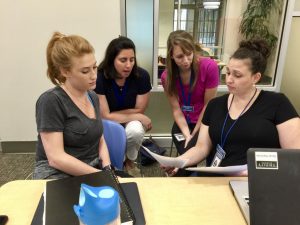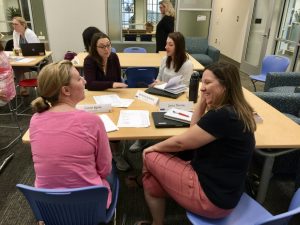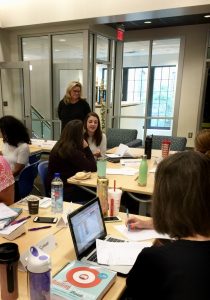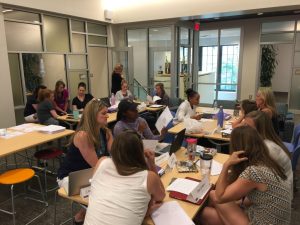October 5, 2015
S. Steinberg’s Room
Marsha Harris, Samantha Steinberg, Michelle Perry
- Educate parents about characteristics of levels, not just label kids a level. Yes, you can share levels with parents as long as they understand that books are not labeled as guided reading levels
- Use teacher judgement when assessing. We’re not trying to hold kids back. We are trying to make sure that comprehension is the focus.
Vision for the year
- Reading Instruction and Pedagogy
- Instruction and pedagogy is our focus for this year
- Where are we? Are teams consistent? Are we all using the same components of balanced literacy (whether we are doing workshop, or Daily 5/CAFE)? Are we communicating effectively?
- Units of Study in Reading- Mini Courses **** Free****
- K-5 Bundle with Trade Books has just been ordered!!! Woop Woop! 🙂
- The Reading Strategies Book- Jennifer Serravallo
- Tiffany Coleman 12/9 WW and team meetings. E Day…does everyone have a team meeting on this day? Time?
- 3’s 9:15-10:05
- PK
- 1st- 1:00 – 2:00
- 2nd- 10:30-11:30
- 3rd
- 4th- 1:10-1:55
- 5th- 10:15-11 and 12-12:45
- Updates on Running Records and Miscue Analysis-
- All Kindergarteners assessed in December. Outliers should be assessed earlier based on PAST results. Guided reading groups start in January.
- We are assessing for an instructional level. Note independent if/when it comes up as you are assessing.
- All teams should now be using white folders & we should all be consistent.
Meaning: Readers often make substitutions that indicate they are thinking about the meaning of the text. For example a reader may say ballet for dance. Ask yourself: Did the meaning of the text influence the error? Does the substitution make sense? Does it make sense in the story?
Structure: Readers often substitute nouns for nouns or verbs for verbs, indicating an awareness of the structure of language. For example, a reader may say We like going for We like to ride. Ask yourself: Does the error fit an acceptable English language structure? Did structure influence the error? Does it sound right?
Visual: Readers use the visual features of print, the letters and words, to read. For example, looking at the picture a reader may say park for play. Ask yourself: Did the visual information from the print influence the error (letter, part, word)? Does it look right?
**Miscue is based on up to the point of error and what information the reader used when they made the error.**
Focus Groups- Balanced Literacy Components/methods/pedagogy/videos
- Small group instruction (guided reading groups/book clubs/strategy groups)
- Shared reading (esp in lower grades) – share the reading with the class, usually with big book, charts, and poems (Nicole)
- Mini Lessons/Strategies/Anchor Charts (Ann Reid)
- Independent
- Word Study (Amanda and Lacey)
- Read Aloud (Robin and Shannon)
- Structure/Management – workshop, D5/CAFE (all)
Focus Groups- Daily 5 Components/methods/pedagogy/videos
- Read to Self- Independent
- Work on Writing
- Read to Someone- Shared Reading
- Listen to Reading- Read Aloud
- Word Work- Word Study
Focus Groups- Units of Study and Orton
- Focus Groups- Units of Study in Writing (Nicole/Monique)?
- Focus Groups- Units of Study in Reading (Samantha/Michelle)?
- Focus Groups- Orton/spelling (Ashley/Grace) spelling, grammar ?
- What worked well…what didn’t?…I need help!
Needs Survey- There will be a survey/google form of a needs assessment for literacy. We need to get a pulse on our community, what’s happening in classrooms/teams, gaps, strengths, etc.(reading, writing, phonics, spelling, grammar, Orton, CAFE, Daily 5, Workshop)



